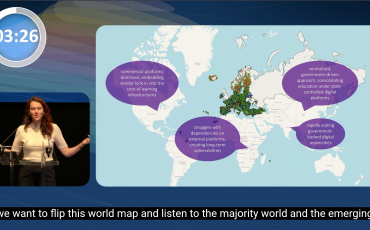Interoperabiliteit is het vermogen van verschillende systemen, platformen en technologieën om samen te werken en effectief gegevens uit te wisselen. Daarvoor worden verschillende standaarden en protocollen gebruikt, zoals OOAPI, EDU-API en QTI.
Belang van interoperabiliteit
Als de interoperabiliteit goed functioneert, kan je als instelling makkelijk en veilig gegevens delen met collega-instellingen. En interoperabiliteit helpt ook bij de flexibilisering van het onderwijs; een student kan eenvoudig onderwijsinformatie van buitenlandse instellingen raadplegen of zich bijvoorbeeld inschrijven voor een module buiten Nederland. Helaas is de huidige praktijk vaak anders, veel instellingen en studenten ervaren problemen omdat standaarden en infrastructuur niet interoperabel zijn. Het is een betrekkelijk nieuw thema, dat door ontwikkelingen op het gebied van digitalisering en flexibilisering steeds belangrijker wordt.
Planning ontwikkeling framework
Dat is ook opgemerkt vanuit Europa. De European Digital Education Hub, (de open online samenwerkingsgemeenschap voor belanghebbenden op het gebied van digitaal onderwijs in Europa en daarbuiten), is namelijk begonnen met de ontwikkeling van een framework voor internationale interoperabiliteit in het hoger onderwijs. Voor Nederland is SURF nauw betrokken bij deze ontwikkeling. Het traject bestaat uit drie fasen. Fase 1 loopt tot november 2023 en resulteert in een ontwerparchitectuur voor interoperabele Europese hoger onderwijs infrastructuren op. Fase 2, geplande afronding in juni 2024, richt zich op de totstandkoming van een gestandaardiseerd kader. In fase 3 wordt het definitieve ‘Higher Education Interoperability Framework’ uitgewerkt, inclusief praktische richtlijnen voor implementatie, onderhoud en beheer.
Zo’n framework is een belangrijke stap voor de internationalisering van het onderwijs. Want door afspraken met elkaar te maken over standaarden en infrastructuur, realiseren we betere internationale interoperabiliteit van applicaties en systemen.
Wil je meer weten? Stuur een e-mail naar evelien.renders@surf.nl of laat een bericht achter in de comments.
Link naar het nieuwsbericht: https://ec.europa.eu/newsroom/eacea_oep/items/796725/en
Link naar de European Digital Education Hub: https://education.ec.europa.eu/focus-topics/digital-education/action-pl…
(English) Important step for internationalisation of education
In order to make international developments in education more efficient and effective, it is important that standards and infrastructure can work together, or interoperate. The European Digital Education Hub has started developing a framework for international interoperability in higher education.
Interoperability is the ability of different systems, platforms and technologies to work together and exchange data effectively. Different standards and protocols are used for this purpose, such as OOAPI, EDU-API and QTI.
Importance of interoperability
If interoperability works well, as an institution you can easily and securely share data with fellow institutions. And interoperability also helps make education more flexible; a student can easily access educational information from foreign institutions or register for a module outside the Netherlands, for example. Unfortunately, current practice is often different; many institutions and students experience problems because standards and infrastructure are not interoperable. It is a relatively new topic, which is becoming increasingly important due to developments in digitalisation and flexibility.
Planning development framework
This has also been noted from Europe. Indeed, the European Digital Education Hub, (the open online collaboration community for digital education stakeholders in Europe and beyond), has started developing a framework for international interoperability in higher education. For the Netherlands, SURF is closely involved in this development. The process consists of three phases. Phase 1 runs until November 2023 and results in a draft architecture for interoperable European higher education infrastructures on. Phase 2, planned for completion in June 2024, focuses on the creation of a standardised framework. Phase 3 will develop the final Higher Education Interoperability Framework, including practical guidelines for implementation, maintenance and management.
Such a framework is an important step for the internationalisation of education. Because by agreeing on standards and infrastructure, we realise better international interoperability of applications and systems.
Want to know more? Send an e-mail to evelien.renders@surf.nl or leave a message in the comments.
Link to the news release: https://ec.europa.eu/newsroom/eacea_oep/items/796725/en
Link to the European Digital Education Hub: https://education.ec.europa.eu/focus-topics/digital-education/action-plan/european-digital-education-hub



0 Praat mee